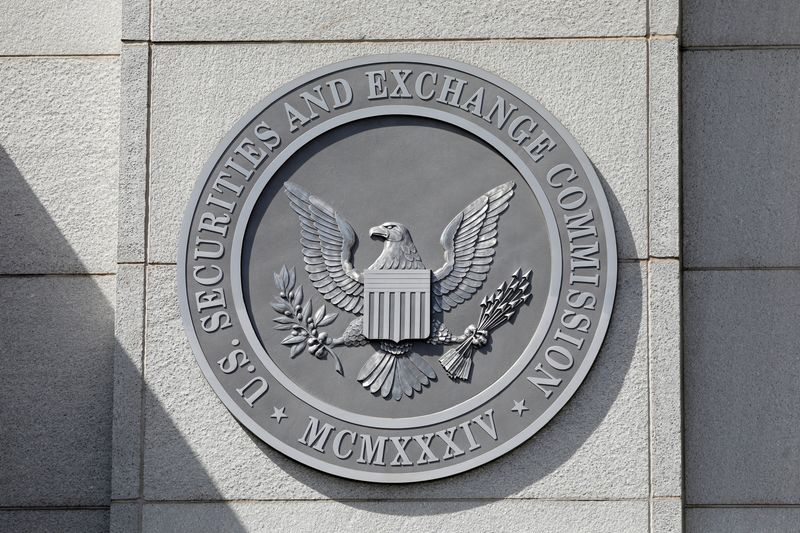By Andrew Chung
WASHINGTON (Reuters) -The U.S. Supreme Court rejected as unconstitutional the Securities and Exchange Commission's in-house enforcement of laws protecting investors against securities fraud, dealing a blow on Thursday to the agency's powers in a ruling that could reverberate through other federal regulators.
The decision, a setback for President Joe Biden's administration, upheld a lower court's ruling siding with a Texas-based hedge fund manager who contested the legality of the SEC's actions against him after the agency determined he had committed securities fraud.
The 6-3 decision was authored by Chief Justice John Roberts, with the court's conservative justices in the majority and the liberal justices dissenting. The court ruled that agency proceedings seeking penalties for fraud that are handled by SEC itself instead of in federal court violate the U.S. Constitution's Seventh Amendment right to a jury trial.
"The SEC's anti-fraud provisions replicate common law fraud, and it is well established that common law claims must be heard by a jury," Roberts wrote.
It was the latest decision curbing the authority of U.S. agencies powered by the Supreme Court's conservatives, who have indicated skepticism toward expansive federal regulatory power.
Thursday's ruling opens the door to challenges to other federal agencies in-house enforcement schemes, as the liberal justices expressed doubt that the decision can be limited only to fraud actions pursued by the SEC.
Justice Sonia Sotomayor, writing for the three liberals, called the decision "a massive sea change," adding that "the constitutionality of hundreds of statutes may now be in peril, and dozens of agencies could be stripped of their power to enforce laws enacted by Congress."
The SEC said it is reviewing the ruling's impact on its administrative proceedings, noting that during the past several years it has prevailed in federal court cases that had "industry-wide implications."
"The SEC will continue to protect investors and enforce the federal securities laws," SEC enforcement division chief Gurbir Grewal said.
The case involved hedge fund manager George Jarkesy, who the SEC fined and barred from the industry after determining he had committed securities fraud. He responded with a lawsuit challenging the legality of the SEC's system.
Jarkesy was supported in the case by numerous conservative and business groups, which long have complained about the regulatory reach of the federal "administrative state" in areas such as energy, the environment, climate policy, workplace safety and financial regulation.
Biden's administration appealed a 2022 decision against the SEC by the New Orleans-based 5th U.S. Circuit Court of Appeals.
The SEC, which enforces various U.S. laws that protect investors, in recent years has faced a series of legal attacks. The Supreme Court in 2018 faulted the way the SEC selected its in-house judges. In 2023 rulings in cases involving the SEC and Federal Trade Commission, the court made it easier for targets of agency actions to mount challenges in federal court.
SEC critics have said it has an unfair advantage litigating cases before its home-turf judges rather than before a jury in federal court.
As a practical matter, SEC cases going forward will not look that different, according to David Fredrickson, a former SEC official.
"Because of the uncertainty, it has been bringing fraud actions for penalties in district court," Fredrickson said.
However, because enforcement actions at many other agencies resemble fraud or other common law claims, Thursday's decision "indicates that all of those actions will now have to be tried before an independent federal judge and a jury," said attorney Andrew Pincus, who has argued cases before the Supreme Court.
'POWER GRAB'
The justices in their written opinions on Thursday clashed over what the ruling means for the separation of powers delineated in the U.S. Constitution between the federal government's co-equal judicial, executive and legislative branches.
Sotomayor criticized the ruling as elevating the judiciary and the Supreme Court over the other branches, calling it a "power grab."
"Judicial aggrandizement is as pernicious to the separation of powers as any aggrandizing action from either of the political branches," Sotomayor wrote.
The view outlined by the liberal justices, Roberts wrote, "would permit Congress to concentrate the roles of prosecutor, judge and jury in the hands of the executive branch."
The SEC pursued 270 new in-house proceedings in the fiscal year that ended on Sept. 30, compared to 231 in federal court.
Since the Supreme Court's 2018 ruling, most SEC administrative proceedings are now handled by the commission itself, with very few - as of March, just two - proceeding before administrative law judges.
The SEC in 2011 began investigating Jarkesy, who founded two hedge funds with his Houston-based investment advisory firm, Patriot28 LLC. The funds had about 120 investors and roughly $24 million in assets under management.

An SEC administrative judge found that Jarkesy and his firm unlawfully misrepresented the identity of the auditor of the funds and value of the holdings. The SEC ordered them to pay a $300,000 civil penalty and Patriot28 to disgorge nearly $685,000 in ill-gotten gains. The 5th Court threw out the SEC's decision.
In a statement, Jarkesy voiced gratitude for Thursday's ruling, decrying "a decade of gross misconduct and blatantly unconstitutional political attacks from the SEC and their in-house court."